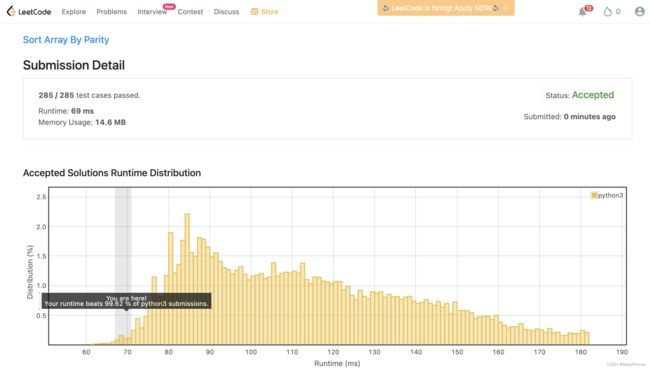Leetcode日练笔记18 #905 #1051 Sort Array By Parity & Height Checker
#905 Sort Array By Parity
Given an integer array
nums, move all the even integers at the beginning of the array followed by all the odd integers.Return any array that satisfies this condition.
解题思路:
沿用上次搜到#283 move zeroes Zitao Wang的思路,用两指针解,偶数就互换,奇数左指针就不右移。
class Solution:
def sortArrayByParity(self, nums: List[int]) -> List[int]:
left = 0
for right in range(len(nums)):
if nums[right] % 2 == 0:
nums[left], nums[right] = nums[right], nums[left]
left += 1
return numsruntime:
绝了。这思路果然强大。果然Discussion Forum里高手多,是个宝藏要多挖掘学习。
#1051 Height Checker
A school is trying to take an annual photo of all the students. The students are asked to stand in a single file line in non-decreasing order by height. Let this ordering be represented by the integer array
expectedwhereexpected[i]is the expected height of theithstudent in line.You are given an integer array
heightsrepresenting the current order that the students are standing in. Eachheights[i]is the height of theithstudent in line (0-indexed).Return the number of indices where
heights[i] != expected[i].
解题思路:
用sorted()生成新的list,然后挨个对比,计数不等的元素。
class Solution:
def heightChecker(self, heights: List[int]) -> int:
expected = sorted(heights)
count = 0
for idx in range(len(heights)):
if expected[idx] != heights[idx]:
count += 1
return countruntime:
明天再看看forum里有没有更好的解法。今天先这样吧。奈特。
---------------------------------------------------5月21日分割线-------------------------------------------------------
forum里cenkay写了个one-liner,可以统计heights出现的频率。拿 [1,1,4,2,1,3] 为例,统计频率之后,就是[0,3,1,1,1] 这里的idx就是height。本来想重写一遍,但发现不知道怎么表达元素也idx之间的对应关系。参考了一下leihao1313的代码(太妙了):
class Solution:
def heightChecker(self, heights: List[int]) -> int:
c = Counter(heights)
res = i = 0
for h in heights:
while not c[i]:
i += 1
res += i != h
c[i] -= 1
return res通过Counter(heights)得到[0,3,1,1,1]。然后res相当于计数的,i是idx。
对于heights里的每个元素,如果某个高度的频次是0,那么idx自动进一位。当idx不是当前元素时,res加1。
(BTW,res += i != h 这一行一开始完全看不懂在干嘛,先再pycharm里试:
但结果出来是8,不是3。完全不理解为什么可以连续两个operator在一行。不知道哪个表达式应该先处理。后来,再试res += 1,就对了。才明白,是看i是否等于h。等的话,默认res加0;不等,res才加1。)
然后Counter(heigts)对应idx的数字减1,在for循环里再看下一个元素等不等与idx。
自己再重写一遍看看:
class Solution:
def heightChecker(self, heights: List[int]) -> int:
c = Counter(heights)
counter = idx = 0
for i in heights:
while c[idx] == 0:
idx += 1
counter += idx != i
c[idx] -= 1
return counterruntime:
这里很不理解。为什么这种方法的time complexity是O(N),但居然表现不如sorted过的O(NlogN)? 不科学啊……



